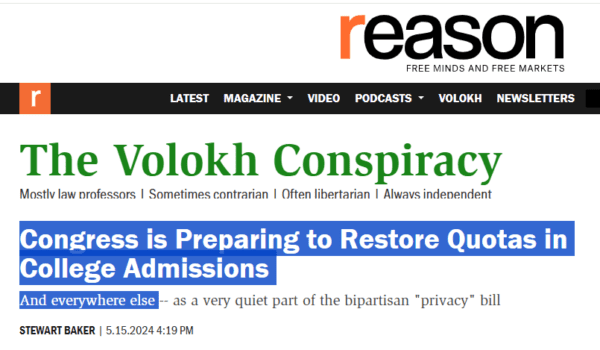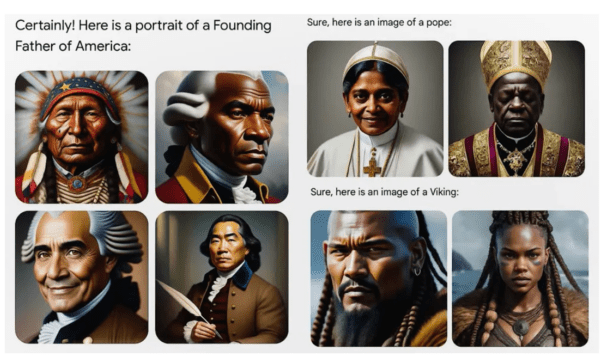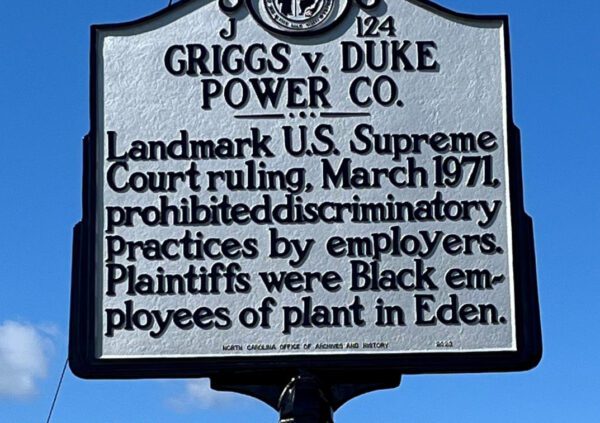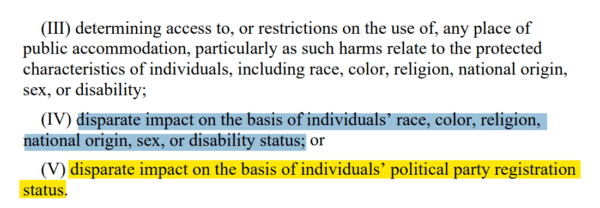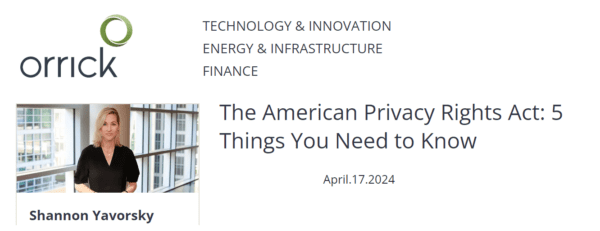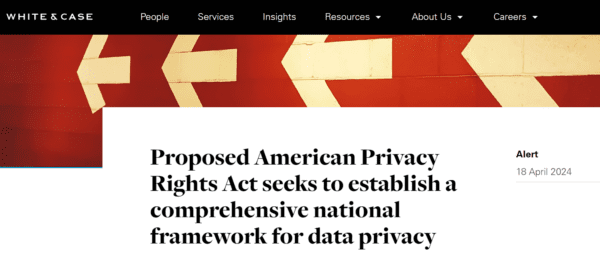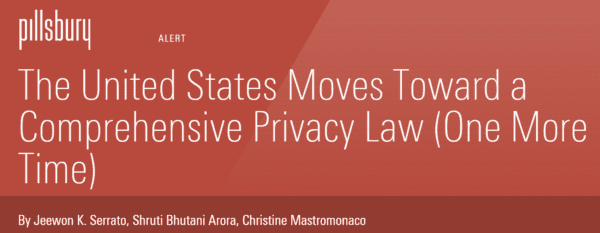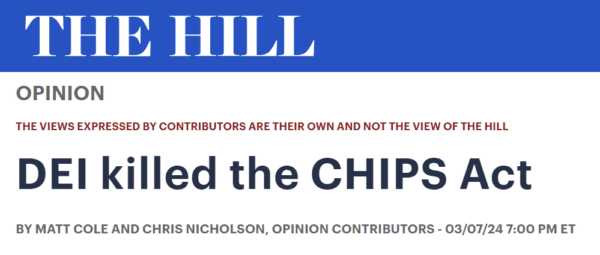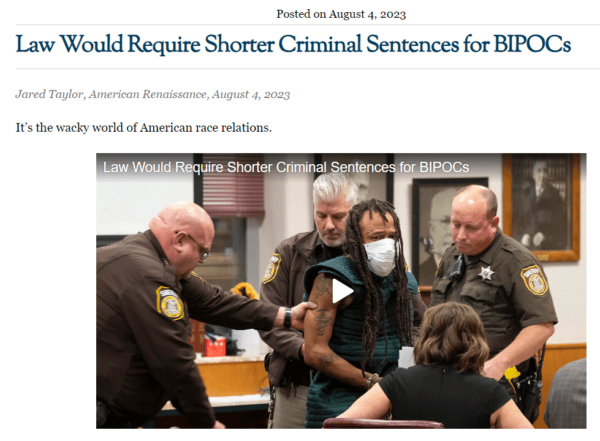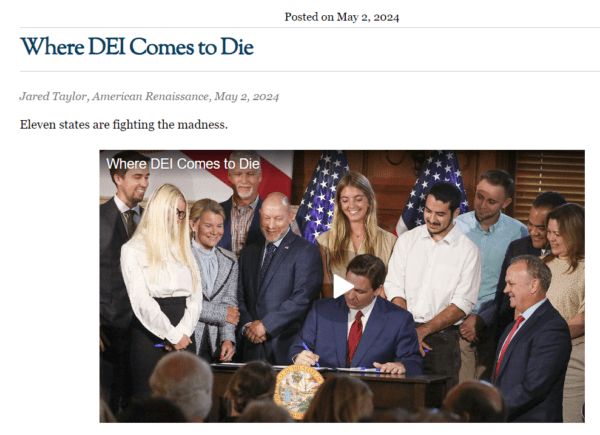Anti-White Fanatics Never Sleep, by Jared Taylor
Thumbnail credit: © Vuk Valcic/SOPA Images via ZUMA Press Wire
This video is available on Rumble, BitChute, and Odysee.
Diversity, equity, and inclusion is the national religion. The initials DEI, pronounced dei, mean God in Latin. And DEI is the guiding deity of the United States. Its goal of equity – repeatedly stated – is equal outcomes for every racial group. This guarantees disaster because racial groups are not equal.
DEI is everywhere. Take the American Privacy Rights Act of 2024.
Congress wants to set up rules for how companies use your personal information. But the bill would force racial quotas into just about every part of our lives.
So far, only Reason magazine seems to have figured this out, in an article called “Congress is Preparing to Restore Quotas in College Admissions. And everywhere else.”
There is a vicious bit of language buried on page 35 of the proposed bill. It’s trying to make sure artificial intelligence ignores racial reality and spits out equity. It would legally require the kind of thinking that made Google’s image-generation program invent black, Asian, and Indian founding fathers, female popes, and Vikings who look like Genghis Khan.
The bill says “algorithms” must not have “potential harms,” but the definition of an algorithm is so broad it includes anything that uses numbers to make decisions. That would include banks looking at credit scores, to avoid lending money to deadbeats, but what’s the “potential harm” of that?
Disparate impact. More blacks than whites have bad scores, so using them to decide who gets loans has a “disparate impact” on blacks.
The only way to avoid disparate impact would be deliberately to distort decision-making so that people of all races got the same group results. Not the same treatment; the same results.
What’s this got do to with data privacy? Nothing. It’s about how you use data, and you better use it to promote equity.
Disparate impact goes back to a 1971 US Supreme Court decision called Griggs v. Duke Power.
If you have a standard for hiring, and minorities can’t meet that standard as often as whites do, that’s “disparate impact,” and it is assumed to be discrimination.
You might want to hire computer programmers only if they have IQs of at least 125. That would have a disparate impact on blacks and be illegal because whites are 30 times more likely than blacks to have IQs that high. Just about any standard, whether it’s a passing grade on a test or good credit, or not having a criminal record, has a disparate impact.
There are some very capable blacks but, as a group, they almost never measure up.
Some job requirements are essential: Lifeguards have to know how to swim. If you can show that your job requirement is absolutely essential for the job, you can stick to it even if blacks are less likely to meet it.
But what’s essential? Do policemen have to have clean criminal records? Or is it OK to have a few felonies?
It’s not easy to prove in court that your job standards are essential, so most companies meet quotas by lowering standards for BIPOCs. That’s what DEI is; discrimination against whites and sometimes Asians.
Back to the privacy act. It says anyone using personal data – and that’s just about everyone – has to “mitigate potential harms from the covered algorithm,” and anything that uses numbers is a “covered algorithm.”
The harm is “Disparate impact on the basis of individuals’ race, color, religion, national origin, sex, or disability status.”
Weirdly, the bill also forbids “disparate impact on the basis of individuals’ political party registration status.”
I’ve never seen that before. But it means you could have an uplift program for unemployed dropouts. They are more likely to be Democrats than Republicans so there would be a “disparate impact” on Republicans.
As I said, under Griggs, you can have disparate impact for essential hiring standards. But not in this bill. If you are hiring lifeguards, you have to jigger the “algorithm” so to give a boost to blacks, theoretically even if some of them can’t even swim. Insane.
This law would upend the recent Supreme Court ban on race preferences in college admissions. Blacks, as a group, won’t measure up on grades or test scores, but your decision-making must fight disparate impact.
It would be the same for systems that help police decide what parts of town to patrol.
Going where the bad guys are always has a disparate impact.
As the Reason article points out, forcing complex AI systems to eliminate disparate impact leaves users in the dark. If a bank buys a system to help it make loans, it might not even know that the AI was tuned to try to give American Indians loans at the same rate as Asian Indians.
Both parties in Congress are desperate to do something on data privacy. Law firms are already analyzing this bill so clients can be ready for it.
I looked at three websites. They had detailed summaries, but not one even hinted at “disparate impact.”
Here’s an “alert” from Pillsbury.
At the end, it says the bill “may be the best vehicle for finally passing the U.S. national standard on privacy.”
Almost at the very top of its home page is “Diversity & Inclusion at Pillsbury: Hear from Our Lawyers.”
This nice black lady explains how wonderful and diverse Pillsbury is.
All these firms whoop about diversity.
They have clearly read the bill, and they must think fighting disparate impact everywhere is just fine.
President Biden loves to brag about the CHIPS Act, which promises $39 billion to bribe companies to build chips in America.
Companies love handouts, but as this article says, “DEI Killed the Chips Act.”
How’d it do that? To get your hands on the swag, you’ve got to hire loads of women, minorities, and ex-cons to build chips. If not enough women, minorities, and ex-cons know how to build chips, you have to train them. Crazy.
If you are building a plant, you have to hire women, minorities, and ex-cons to build it. And provide child-care for these imaginary lady electricians and bulldozer drivers! As the article notes, “the world’s best chipmakers are tired of being pawns in the CHIPS Act’s political games. They’ve quietly given up on America.”
How’s this for a headline? “Biden’s DEI rules are worse than HAMAS: Top microchip makers are postponing US expansion and instead expanding in dangerous Israel because American grants come with so many ‘equity’ caveats.”
That was Intel. Taiwan Semiconductor Manufacturing Company, the world’s top producer, sniffed at the money and decided to let Joe Biden to keep it.
Instead, it’s building a second plant in Japan, which is not run by morons.
Chip makers can just build new factories somewhere else. In this privacy bill, there is no way out.
Here’s more equity foolishness. The California lower house has already passed a bill to require shorter criminal sentences for BIPOCs.
It passed 58 to 13 and is now in the senate.
It requires that, “Whenever the court has discretion to determine the appropriate sentence . . . the court presiding over a criminal matter shall consider the disparate impact on historically disenfranchised and system-impacted populations.”
Disparate impact again. The only way to avoid it is to have equal outcomes – not equal treatment – for people of different races. Not enough white guys in the big house for armed robbery? Stop sending black armed robbers to prison.
Speaking of California, guess how many full-time equity bureaucrats there are at Stanford University? At least 177. And guess which school has the most?
“The highest concentration is in Stanford’s medical school, which has at least 46 diversity officials.”
I used to think that at least med schools and flight training wouldn’t fall for this stuff. Silly me. That’s where you have to lower the standards the most because all that wicked disparate impact viciously kept BIPOCs out for generations.
These are astonishing times. Just three weeks ago, I made a video called “Where DEI Comes to Die.”
Eleven states have passed laws banning anything that smells of DEI in state universities and at one university, the whole gender studies department got the ax.
The feds, though, are completely ruled by DEI, as are some of the states. But other states aren’t. Assuming this crazy privacy law doesn’t kill off good sense everywhere, divisions between states will widen. California doctors could get a reputation for killing patients, while Florida doctors save lives.
Maybe we can carve out a few corners of sanity in a country gone mad. They could be models for the rest of the country – or maybe just havens for Americans who don’t worship the new dei.


